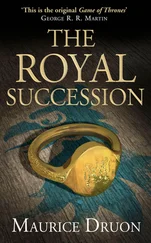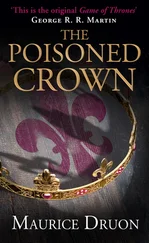For two middle-class Normans who, twenty years earlier, called themselves simply the brothers Le Portier, they had had prodigious careers and, the elder ever pushing the younger upwards, succeeded in sharing power successfully between them, one controlling the civil power, the other the ecclesiastical. Between them they had destroyed the Order of the Knights Templar.
Enguerrand de Marigny was one of those rare men who have the certainty of being part of history while still alive, because they have made it. And he needed to remember where he had started, and to what heights he had risen, in order at this moment to be able to bear the great sorrow which had come to him. ‘Sire Philip, my King,’ he thought as he gazed at the coffin, ‘I served you as well as I knew how, and you confided to me the highest tasks, as you conferred upon me the greatest honours and innumerable gifts. How many days did we work side by side? We thought alike in everything; we made mistakes, and we corrected them. I swear that I shall defend the work we accomplished together and shall pursue it against those who are now making ready to destroy it. But how lonely I shall feel!’ For this great politician had fervour, and he thought of the kingdom as might a second king.
Egidius de Chambly, Abbot of Saint-Denis, on his knees at the edge of the vault, made a last sign of the Cross. Then he rose to his feet, signalled to the sextons, and the heavy flat stone rolled into place above the tomb.
Never again would Louis X hear his father’s terrible voice saying, ‘Be quiet, Louis!’
And far from being relieved, he was seized with panic. He heard a voice beside him say, ‘Come on, Louis!’
He started; it was Charles of Valois who had spoken, telling him to move forward. Louis X turned towards his uncle and murmured, ‘You saw him become King. What did he say? What did he do?’
‘He entered upon his responsibilities without hesitation,’ replied Charles of Valois.
‘He was eighteen, seven years younger than I am,’ thought Louis X. Feeling everyone’s eyes upon him, he did his best to stand upright, and began to walk forward while the procession formed behind him, monks, their heads bent, hands in sleeves, singing a psalm. Since they had been singing continuously for twenty-four hours, their voices were beginning to grow hoarse.
Thus they went from the basilica to the chapter house of the Abbey, where was laid the traditional repast which closed the funeral ceremony.
‘Sire,’ said Abbot Egidius, leading Louis to his place, ‘we shall say two prayers from now on, one for the King God has taken from us, the other for him whom He has given us.’
‘Thank you, Father,’ said Louis X in an uncertain voice.
Then he sat down with a tired sigh and at once asked for a cup of water which he swallowed at one gulp. During the whole meal he remained silent, eating nothing, drinking a great deal of water. He felt feverish, physically and mentally ill.
‘One must be robust to be a king.’ It was one of the maxims Philip the Fair used to his sons when, before they were knights, they used sometimes to grumble at the exercises of arms or at the quintain. 6‘One must be robust to be a king,’ Louis X repeated to himself during these first moments of his reign. He was one of those people whom fatigue makes irritable, and he thought irritably that when one is bequeathed a throne, one should also be bequeathed the necessary strength to sit upright on it. But who, unless he had the strength of an athlete, could have borne the past week without feeling exhausted?
That which precedent demanded of a new sovereign, as he assumed his post, was utterly inhuman. Louis had had to attend his father’s deathbed, receive the transmission of the royal miraculous power, 7countersign the last will and testament, and take his meals for two days beside the embalmed corpse. Then had followed the transportation of the body by water from Fontainebleu to Paris, a whole series of progresses and vigils, interminable religious services and processions, all in the most appalling winter weather, paddling in frozen mud, a sullen wind taking your breath away, sleet pricking your face.
But Louis X admired his uncle of Valois who, throughout these days, had been constantly at his side, making every decision, solving questions of precedent, indefatigably, helpfully, terribly present. ‘Without him, what should I have done?’ thought Louis.
It was Valois who seemed to have the sinews of a king. Already, talking to the Abbot of Saint-Denis, he was beginning to express concern about Louis’s coronation, which could not take place till the following summer, for the Abbot of Saint-Denis had besides the guardianship of the royal tombs, the keeping of the banner of France, which was brought out when the King went to war, and the guardianship of the instruments and vestments of coronation. The Count of Valois wished to know whether all was in order: was the great mantle in need of repair? Were the caskets for transporting the sceptre, the spurs and the hand of justice to Rheims in good condition? And the gold crown? It was essential that the goldsmiths should measure Louis X’s head as soon as possible in order to alter the crown to the right size.
How Monseigneur of Valois would have liked to wear that crown himself! And he fussed about like one of those old spinsters who busy themselves pinning the dresses of brides.
As he listened, Abbot Egidius watched the young King who, once again, was shaken by his cough, and he thought, ‘Of course, every preparation must be made; but will he last till then?’
When the meal was over, Hugues de Bouville, First Chamberlain to Philip the Fair, rose to break his carved wand before Louis X, signifying that he had accomplished his ultimate office. Fat Bouville’s eyes filled with tears, his hands trembled and he tried three times before he succeeded in breaking the wooden wand, the delegated counterpart of the great sceptre of gold. Then he sat down again next to young Mathieu de Trye, First Chamberlain to Louis who was to succeed him. He murmured, ‘It’s up to you now, Messire.’
Everyone went out, mounted their horses, and the procession re-formed for the last lap. Outside there was but a thin crowd to cry, ‘Long live the King!’ The populace had got cold enough the day before, watching the great procession whose head had already reached Saint-Denis when its tail had not yet passed the Porte de Paris; today’s procession had nothing exciting to offer. Sleet was falling, soaking through everyone’s clothes to the skin; only the most ardent spectators remained, or those who could shout from their own doorsteps without getting wet.
From the time when he had first known that he would one day be King, Louis had dreamed of entering his capital in glorious sunshine. And when the Iron King, rebuking him, said harshly, ‘Louis, don’t be so stubborn!’ how often had he not wished that his father might die, thinking, ‘When I can command, everything will be different, and people will see what kind of a man I am.’
But now he had been proclaimed King, and yet there seemed to be nothing to mark the fact that he had been suddenly transformed into a sovereign. If anything had altered, it was only that he felt himself weaker than yesterday, ill-assured in his new-found majesty, and thinking at every turn of his father whom he had so little loved.
With lowered head and shaking shoulders, he pressed his horse on between empty fields where the stubbles showed above a carpet of snow; he seemed to be leading the survivors of a conquered army.
Thus they arrived at the outskirts and entered the gates. The people of the capital seemed no more enthusiastic than those of Saint-Denis. Besides, what reasons had they to demonstrate happiness? The early winter hindered communications and increased the death-rate. The last harvest had been extremely bad; food was scarce and its price continually increasing. Famine was in the air. And the little that was known about the new King contained nothing to awaken hope.
Читать дальше



![Джеймс Чейз - Not Safe to Be Free [= The Case of the Strangled Starlet]](/books/417649/dzhejms-chejz-not-safe-to-be-free-the-case-of-the-thumb.webp)








